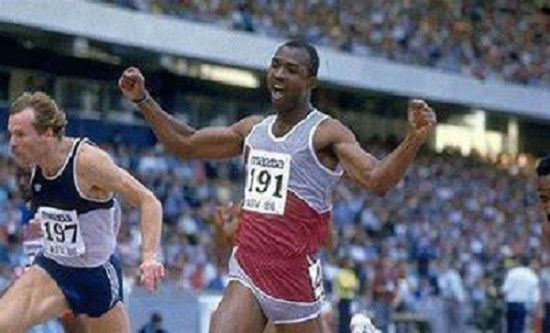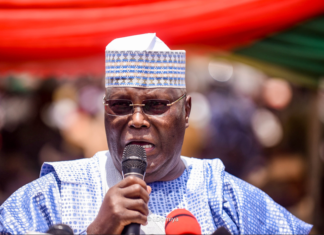By Ikeddy Isiguzo
Thanks for the joys your races provided. And congratulations as your university inducts you into its Hall of Fame.
Thanks for those moments you were globally ranked No. 1 in 100m in 1986.
Thanks that with an injury (“How can you be injured now? You must run.” Brown Ebewele had told Chidi before the race) at the All Africa in Nairobi’s Kasarani Stadium, which the Chinese had just completed for the Games, you won. Imoh flew to a possible world record, but for the wind, that was outside the permitted limits.
Thanks for telling the world Nigeria has world class sprinters, and those you inspired to carry on that tradition.
Thanks for Barcelona, being in the team that won the 100m Olympic relay silver at Estadi de Olimpic Montjuic.
Thanks for that race that gave me a chance to ask Carl Lewis the question that rattled him. Carl, what would have happened if Davidson Ezinwa got the baton before you in the relay final?
Imoh in figures
100m, 1983, Gold, World Universities Games in Edmonton, Canada, Ben Johnson was third
1984, African champion, 1985
Silver, IAAF World Cup, Canberra, Australia (behind Ben Johnson)
African Champion-Gold, World University Games in Kobe, Japan, the first to retain the 100m title since the commence of the Games in 1924, 1986
Silver medal 1986 Goodwill Games (Ben Johnson won; Carl Lewis was third), World leader in 100m, 1987
Gold, All Africa Games, Nairobi, Kenya
1991, 60m, bronze, World Indoor Championships
1992, Silver, 4x100m, Olympic Games, Barcelona, Spain
I remember every detail of that 4x100m relay race which I watched standing; Sam John, of The Guardian, was beside me. Oluyemi Kayode (may the Almighty rest him, he died 1 October 1994, in a car crash on his way to Washington to celebrate Nigeria’s independence) handed to Imoh, who burnt former world record holder Leroy Burrell on the second leg.
We held our breaths. Olapade Adeniken, injured, lost the race for the curve to Dennis Mitchell at the 200m turn. What did we care? A medal was all that mattered and one was heading our way.
Davidson Ezinwa anchored for Nigeria, a cherished silver in the bag, moments after the Nigerian women had taken the bronze. It was Nigeria’s best Olympics to that moment, with two silver medals from boxing. We were walking on cloud.
There was no time to ponder the fact that were so close to losing the silver to the Cubans, if not for the chase that Ezinwa gave Carl who blew to a new world record for the USA – 37.40 seconds, Nigeria 37.98 seconds, and Cuba 38 seconds. The Cubans lost the silver by .02 second, another proof every part of a second mattered.
At the post-race conference, the Americans were bragging in the guise of asking questions. Their attempts to re-build the Carl Lewis brand was not lost on anyone observing. Question after question was primed to squeeze out a story of the heroics of Carl in a race that had the efforts of three other Americans. All of them were at the briefing but hardly any questions came their way.
My attempts to get a question in were ignored. When they had exhausted themselves, I was recognised to ask a question. I asked Carl Lewis what he thought would have happened if Ezinwa got the baton before him.
“The great thing about this US team is that it does the job for me. I remember Dennis shouting, ‘Carl go, go, the Nigerians are coming’,” Carl said. Ezinwa had beaten Carl Lewis in the 100m at the Texas Relays, two months to the Olympics.
A great silence descended on the room as I left. I had spoilt the celebration of the Americans, and it struck me that I was the only African in that room. One of the greatest moments of my life, holding the world to ransom, sportily speaking, because we had a team that placed us on the map of the world. Olapade (fifth) and Oluyemi (seventh) were in the finals of the 200m, in which Michael Johnson and Linford failed to qualify. Olapade and Ezinwa also made the 100m final. These speak for the quality of athletes we had.
My belated apology to Sam John, SJ, who remains my friend, though I refused to share what transpired at the post-race conference with him. Knowing that I would send the story by phone, he waited. It was my exclusive.
When I got Lagos on phone, I asked for Chuks Ugwoke – Ugwoke, became a Commissioner for Information in Enugu State for eight years – to take the story: in Igbo. Who says the mother tongue has no uses?
SJ could not believe it. He was stunned beyond silence. I am glad that though tribe and tongue differed in Barcelona, SJ and I are still in brotherhood 28 years on. I am sure he has forgiven Chuks. They once lived together in Lagos.
Imoh, raised in Aba, Abia State, who represented old Imo State in National Sports Festivals before leaving for the USA, on an athletic scholarship, where the University of Missouri benefitted from his athletics feats, was a school champion. He held these Missouri records – 200m outdoor, 19.9 seconds; 100m outdoor, 10.00 seconds, and 55 m indoor, 6.10 seconds.
The University of Missouri has inducted him into its track and field Hall of Fame. A former African record holder in 100m and 200m, Imoh started off as a footballer in Owo, Ondo State before taking to the tracks in Aba.
His career was one of many that Nigerian boycotts of international competitions to protest apartheid in South Africa, affected. In 1986, at his peak, and with Nigeria having one of its best assembled team for the Commonwealth Games, in Edinburgh, Scotland, like in 1976 (Olympic Games) and 1978 (Commonwealth Games) – both events were in Canada – the Federal Government pulled out of the Games, with African countries and some in the Caribbean. Imoh finished his illustrious career without an appearance at the Commonwealth Games.
Thanks, Imoh and your generation. We had stories to write because there were great actors on the stage. He is 55, today, 27 August and lives with his family in the USA.













